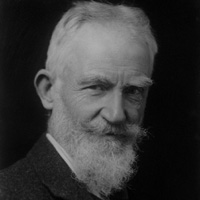George Bernard Shaw - Biography and Works
George Bernard Shaw (1856-1950) was born in Dublin, Ireland. His father was a civil servant. As he hated organized training, he could not get a regular formal education. In 1876, as a young man, he went to London, where he struggled financially and later established himself as a theatre critic in the eighties and nineties. As a novelist, he is highly influenced by Ibsen.

George B. Shaw (1856-1950)
George Bernard Show belongs to the 19th century theatre of realism. Some of his writings are associated with the early 20th century mode of theatre. To which school of theatre, he belongs makes no difference as far as his affiliation to the emergence of the 19th century realism is concerned. Like Oscar Wilde or Ibsen, George Bernard Shaw wrote plays in keeping with the ideology of realism in theatre. He upheld the belief that theatre should be dominated by realism and should express opinions on social and political issues.
He wrote mainly to attack the social mode of behavior. His earliest dramas like Plays Pleasant and Unpleasant (1898) and Widower's Houses and Mrs. Warren's Profession violently attack social hypocrisy, while in plays such as Arms and the Man and The Man of Destiny the criticism is less fierce.
As a firm upholder of realism in drama Shaw disliked the romantic and sentimental Victorian style and content of the late 19th century. Shaw believed that drama belonged to only two categories the frivolous and the serious. He named serious drama as a problem play, and believed that "only in the problem play is there any real drama".
Shaw's first great play was Man and Superman (1903). It is a comedy about two battling lovers. Shaw's next play Major Barbara written in1905 and published in 1907 dealt with the tragic-comic irony of the conflict between real life and the romantic imagination. In Major Barbara, one of Shaw's most successful discussion plays, the audience's attention is held by the power of the most witty discussion that man can achieve aesthetic salvation only through political activity, not as an individual. His play Pygmalion (1913) was later made into a film and many adaptations were made from the play. The screenplay he wrote for the first version of it won an Oscar Award in 1938. During his lifetime, he wrote more than 60 plays and won many other awards, among them the Nobel Prize for literature in 1925.
Shaw's early career in the field of play-writing was moderately successful. The English society did not give him respect when Shaw published his early plays. Some of the plays of Shaw are so radical that the tradition-bound English society hesitated to assimilate his ideas pleasingly. As his mature plays emerged with a bright prospect of success, Show's popularity increased to his utter dismay.
Show's gift of analysis and philosophical reflection created in his works a new kind of drama that has sometimes been named for him Shavian. The term implies a deep interest in ideas rather than character and a propensity for elaborate discourse between characters who represent different points of view. Shaw assumed that drama should amuse and entertain, but of much greater importance was his didactic motive. Drama should teach a lesson about something of great moral importance.
Shaw is a playwright who makes a frequent use of paradox and witticism. He is witty. His argumentative style mixed with the witty use of logics has made Shaw a dramatist of distance significance. However, Shaw was basically a philosophical writer. His plays can be seen as having a specific theme on which the characters constantly discourse.
Shaw is not simply a playwright. He is a philosophical playwright. Through the vehicle of his plays he wanted to project his philosophy. To project his philosophical ideas so that readers can better understand it, Shaw chose one of his characters in his play as his Mouthpiece.
Socialism is the political ideology show enthusiastically admired. Creative evolution is the belief he professed. Exercise of life force is his method by virtue of which humanity has to transcend. Shaw is not revolutionary but evolutionary in his attitude to society. According to him, society should not be destroyed by a revolution. It should be used as instrument to launch socialist reform. Shaw appears to be an upholder of evolutionary socialism.
